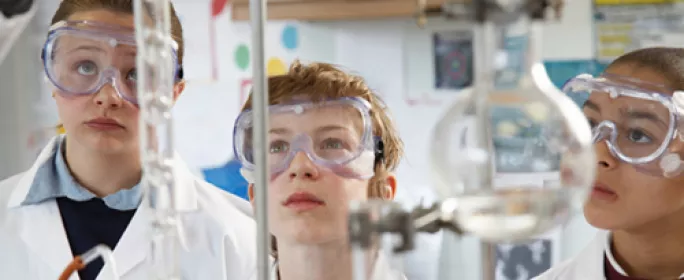
GCSE results: Entries in single sciences ‘fall off cliff edge’
Serious concerns have been raised following the sharp decline in entries for separate sciences at GCSE.
Each of the single sciences suffered significant falls in entries compared to last year, with biology down by almost a fifth (18.6 per cent), and chemistry and physics dropping by 16.8 per cent and 14.6 per cent respectively.
The disappointing numbers will be a worry for ministers, who last week trumpeted the fact that the separate sciences were among the top ten subjects studied at A-level.
Katja Hall, deputy director general of the CBI, said it could be “catastrophic” for the economy if the trend continued. “Entries into single sciences have fallen off a cliff-edge and that is deeply disappointing as they are fundamental to the UK developing a highly-skilled workforce that can compete globally,” Ms Hall said.
“This trend could be catastrophic for the long-term health of the economy if it continues, so we must get more students into school laboratories and studying separate sciences.”
But while single sciences plummeted, science and additional science went up. According to Andrew Hall, AQA chief executive, the reason behind the numbers could have been down to students being put off by the sheer number of end-of-year assessments they would have faced taking the individual subjects.
“These qualifications were designed to be taken in a modular way, they are now having to be taken all in final exams,” Mr Hall said. “So if you are doing three sciences separately you end up with nine exams and three controlled assessments.That is a significant load of assessment.”
“We think 20,000 to 24,000 have moved away from doing that and have decided to take the alternative route... of science, additional science and further additional science.”
He added: “The good news is that as much science is being studied in the UK as before, which I think is a really important message to take back - it would be terribly wrong to interpret the fall in single sciences as a reduction in the amount of science being studied by people in the UK.”
Another reason behind the growth in science at the expense of the single sciences was also attributed to the rise in students opting to take computer science, which is now part of the English Baccalaureate suite of subjects.
The number of entries in computer science rose to more than 16,000 this year, compared with just over 4,000 in 2013.
However, Wendy Piatt, director-general of the Russell Group of universities, said that students who studied the separate sciences were more likely to go on and study the sciences later on in life.
“We note that numbers students taking separate science GCSEs have fallen this year - albeit with more taking the new Further Additional Science qualification,” Dr Piatt said.
“We know, from previous years, that pupils who take separate science GCSEs are more likely to take and excel at Stem subjects at A-level. We hope the increase in Further Additional Science also results in more students taking science A-levels in future. It would be a cause for concern if they did not.”
Related stories:
GCSE results: schools ‘shocked’ by fall in English grades as overall passes rise - August 2014
GCSE results: fears grow over English and maths grades - August 2014
Early GCSE entries fall dramatically - May 2014
Register with Tes and you can read five free articles every month, plus you'll have access to our range of award-winning newsletters.
Keep reading for just £4.90 per month
You've reached your limit of free articles this month. Subscribe for £4.90 per month for three months and get:
- Unlimited access to all Tes magazine content
- Exclusive subscriber-only stories
- Award-winning email newsletters
You've reached your limit of free articles this month. Subscribe for £4.90 per month for three months and get:
- Unlimited access to all Tes magazine content
- Exclusive subscriber-only stories
- Award-winning email newsletters




